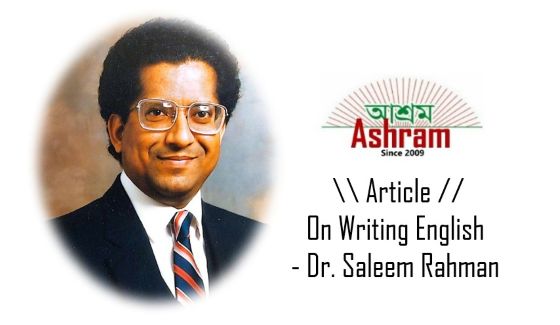On Writing English - Dr. Saleem Rahman

I have learned through a lifetime of experience and reading the works of accomplished writers that English prose should have cleanliness of expression; brevity, and accuracy. Let me define, at the outset, the sense in which I am using these three terms. By cleanliness of expression, I mean you should be without the mental and verbal ‘fog’ in your writing. To me, brevity signifies consciously avoiding verbosity and wordiness and, finally, I use accuracy to convey being both factually verbally accurate. This means: capturing the exact sense and ‘mood’ of the word. We regularly come across written words that have none of these attributes. My purpose is to help my readers to adopt these literary virtues to improve their prose to the significantly marketable level. After all, your professional writing should have its own payoff to encourage you to continue down the path of regaling your readership with prose they look forward to reading.
Essentially, what I am setting out to share with you are some rules of usage, some elements of composition, and a few principles of form. Add to it, if you will, the often-misused words and phrases that tend to tarnish an otherwise well-written piece. Including words and expression of a more recent vintage is not to be shunned; but it should not damage the tenor of the pristine glory of the English language. They say, ‘Brevity is the soul of wit.’ So, if you learn the craft of being brief with clarity untouched, you will have become adept at being witty and an inventor of some unique aphorisms. This will endear you to your readership and enlarge its appreciative circle. When you set out with your clearly articulated, creatively brief, and accurate writing that embraces the mood and personality of each word, your witticisms will appear makes your readers very happy.
I will spin my advisory yarn on the triplet of sound English writing — clarity, brevity, and accuracy — in the weeks and months that will follow. But I wouldn’t mind waxing a bit more on the cleanliness of expression: being without the mental and verbal ‘fog’. The crux of it is predicated on the following five-pronged formula:
- Keep your sentences short — on average
- Prefer the simple usage to the complex
- Avoid unneeded words the same way you avoid puddles when you walk
- Put some ‘action’ into your verbs to make your writing prose, not prosaic; and
- Write the same way you walk
More of this, later.
If writers keep their sentences reasonably short, they have to choose their verbs carefully/ This means they should do it in a way that enlivens their message and makes their little sentences go a long way. Consider the following simple example:
“How is your description effective?” versus “What makes your description effective?”
The first statement is a flat question; devoid of any genuine feeling. It is asked in a matter-of-fact way, and does not show any interest in knowing your answer. It doesn’t seem to have interest in what is it that lends effectiveness to your writing. However, the second question wants to go a little deeper and wants to learn about the sources of your descriptive writing that makes it fulfill a certain purpose that you consider desirable. So, you should mind the choice of your verbs. Your verbs move your sentence in a direction you thoughtfully desire. Take another example:
“It is the most recently recruited engineers that take the assigned tasks more seriously.” Now consider the alternative statement, “The new hires are more motivated to address the challenges their tasks present.”
The second statement paints a vivid picture of a group that takes avid interest in handling their tasks right away. There is movement in this statement, not just an insipid mention that they take their tasks seriously. If they take it more seriously, so what? How is their serious attitude actually reflected in their relevant conduct? Etc., etc. Similarly, one can say that, “She is not very efficient at her job.” It is a flat noun-based indictment of her as an employee. Compared to that, consider another statement, “She allows herself to arrive late and takes an extended breakfast break before starting work.” The second statement graphically pins it down and paints a vivid and dynamic picture of someone who is ‘at work’ but not really ‘working’ until much later, after her arrival. Carefully selected verbs are the ‘delivery systems’ attached to your message-head. They evoke an instant response in the reader, rather than just staring at a dull stream of information bits.
You should use active-voice and ditch the passive-voice, unless you are trying to be deliberately protective of someone. For instance, when talking to your manager about a senior colleague who made an error in judgment, you can possibly take the risk of saying, “He made an error in judgment,” and squarely, and clearly place the responsibility where it belongs. But, if your senior management is involved, you had better say something like, “As you know, apparently mistakes were made.” Who made those mistakes? The situation forbids you to specify that. The role of active-voice is to add clarity to your expression, whereas the use of passive-voice, as indicated, saves your own skin!
References
Gunning, Robert and Douglas Mueller. (1985). How to Take the Fog Out of Writing. Published by, The Dartnell Corporation. Available at: https://www.amazon.com/How-Take-Fog-Out-Writing/dp/B007T1S5B4
Dr. Saleem Rahman
Ottawa.
-
en-ashram-N/G
-
07-10-2025
-
-